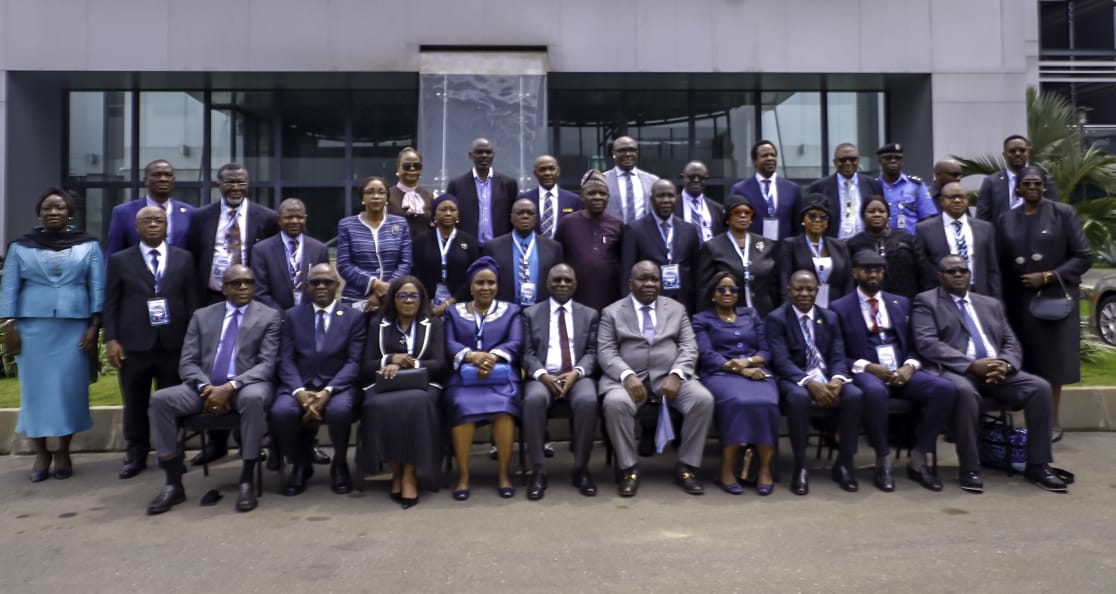By Stephen Ubanna
More facts have emerged why the Nigerian Maritime Administration and Safety Agency, NIMASA, has identified the Judiciary, which is the third arm of Government, next to the Executive and National Assembly, as the major pillar of the nation’s blue economy project.
With the passage of ‘’the Suppression of Piracy and other Maritime Offences Bill’’ by the National Assembly and signed into Law by former President Muhammadu Buhari, now deceased, in June 24, 2019, and the fag off of the Integrated National Security and Waterways Protection Infrastructure, popular, the Deep Blue Project, appears to have improved the collaboration between NIMASA and the National Institute of Advanced Legal Studies to building the capacity of judicial officers in admiralty Law. .
This is evident with the conviction of no fewer than 10 victims under the country’s anti-piracy Lw between 2021 and now and which had reduced to the barest minimum the criminality in the Nigeria’s Exclusive Economic Zone, EEZ.
This may have given the Leadership of NIMASA, the audacity to urge the international shipping companies to reduce the war risk insurance premiums on Nigerian-bound cargoes, which had been on going over the last three years.
There is no gain saying the fact that in the last three years or thereabout, Nigerian shippers had paid over United States, US$1.5 billion to Lloyds of London, Protection and Indemnity Insurance firms in War Risk Insurance Premium.
According to informed NIMASA sources, Nigeria has 4,610 flagged vessels with a total of 6,131,814.55 Gross Registered Tonnage, GRT, and 1,102 cabotage vessels with a combined tonnage of 2,037,184.63 GRT, clearly showing that a total of about 4,610 vessels might be paying this WRI, Premium, to Lloyds of London.
Past and present leadership of NIMASA, who had identified the judiciary, as a major partner in the realization of the benefits of the Blue Economy project had stopped shot at saying that it gave it the courage to push for the review of the NRI, premium, with the convictions of arrested pirates to prove that the Nigerian waters and the Gulf of Guinea are safe for ocean going vessels.

Speaking at the 4th Edition of the Admiralty Law Colloquium in Lagos, the nation’s Commercial nerve centre with the theme ‘’Charting the Course of Nigeria’s blue economy’, a reflection of the increased national attention to the potential of the maritime industry in driving economic development, Dayo Mobereola, the NIMASA, Director General, had corroborated the views of Bashir Jimoh, his predecessor in office, that the Judiciary is a crucial actor where interpretation of legal instruments and case decisions ‘’remains a vital tool for sustainable development of Nigeria’s Blue Economy’’.
The Maritime Regulatory Agency, Chief Executive Officer, CEO, may have the opportunity provided by the admiralty Colloquium to re-echo the important role of the Nigerian Judiciary in interpretating extant maritime laws thereby helping ‘’to improve the nation’s maritime industry standards as obtained in other nations with strict maritime Laws and aiding the development of the Blue Economy.
Justice Kudirat Motnmori Olatukumbo Kekere-Ekun, the Chief Justice of Nigeria, CJN, who was said to have been represented at the high-profile event by Justice Emmanuel Akomoye Agim, had commended the Management of NIMASA and NIALS, for collaborating to host the colloquium, described as central to building the capacity of judicial officers in admiralty Laws.
The CJN, who could not hide her feelings had told participants at the Admiralty Colloquium event that ‘’the task before us is to ensure that Nigeria blue economy does not reman a conceptual aspiration but becomes a tangible driver of growth, equity, and sustainability’’.
She was said to have sounded it loud and clear, that ‘’the judiciary must not stand on the shoreline as a passive observer but rather as an active navigator -steering the ship of justice through the complex waters of maritime development’’.

The first session of the event, according to Osagie Edward, a Deputy Director and the agency spokesperson, saw renowned maritime experts like Emeka Akabogu, a Senior Advocate of Nigeria, SAN, and Chukwuchefu Ukatta, deliver papers in line with the theme of the Admiralty Colloquium, emphasizing ‘’the imperative of synergy between judicial processes and development of the Blue Economy project in Nigeria.
A.J. Abikan, a professor, and Director General, NAILS, who had chaired a panel discussion, which was quickly followed by an interactive session was said to concluded the event, which had in attendance, Justice M.B. Dongbam-Mensem, President Court of Appeal, represented by Justice E. O. Williams-Dawodu and John Tsoho, Chief of Federal High Court represented by Justice. Faji.
The Admiralty Colloquium, which is a yearly event organized by NIMASA in partnership with NAILS, with the support of the National Judicial Institute, JNI, which had entered its fourth Edition, appears to have achieved its purpose which is to facilitate discussions on maritime law, focusing on improving adjudication, enhancing the country’s maritime security and advancing the development of the blue economy as obtained in the Asian country of China, Costa Rica, India, Portugal, Samoa, Trinidad and Tobago, Vietnam and the African countries of Gambia, Kenya and Tunisia.
The World Bank/IMF, defines the blue economy, as ‘’sustainable use of ocean resources for economic growth, improved livelihoods while preserving the health of the ocean ecosystem’’. This may have informed why several countries including Nigeria have initiated the implementation of the blue economy project and have deepen bilateral cooperation within this field.






